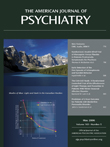Neuroscience in Psychiatry Training: How Much Do Residents Need To Know?
Abstract
Objective: With the explosion of research in psychiatric neuroscience, the extent and means by which neuroscientific progress will translate into clinical care remains largely uncertain. The authors sought to determine how this dilemma is currently being played out in residency training programs, in which training directors must decide how best to integrate neuroscience teaching in a rapidly changing clinical landscape. Method: The authors surveyed U.S. and Canadian psychiatry residency training directors to characterize current and future trends in neuroscience education and to examine training directors’ views on the relevance of neuroscience to clinical practice. Results: The amount of neuroscience in residency curricula has increased significantly over the past 5 years, and further increases are expected in each specific neuroscience content area examined. While most training directors agreed that training in neuroscience was important for all residents, even those becoming primarily psychotherapists, relevance to future (but not current) practice was consistently cited as a motivating factor. Conclusions: While psychiatric residency programs continue to increase the neuroscience content of their curricula, it remains unclear how this added training will influence clinical work. Reframing current practices, including psychotherapy, into a neuroscientific context may ultimately prove more useful to trainees.



